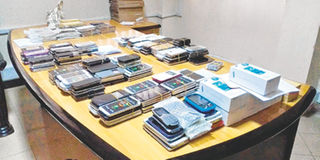Tigo joins regulator in campaign against using counterfeit phones

Counterfeit mobile phones that were seized during a operation conducted by the Fair Competition Commission on September 12, 2014. PHOTO|FILE
What you need to know:
The Tanzania Communications Regulatory Authority (TCRA) has set June 16, 2016 as the deadline when counterfeit mobile phones, blamed for some economic and health hazards, will be switched off.
Dar es Salaam. As the deadline for automatically switching off all counterfeit mobile phones gets closer, Tigo yesterday joined the sector’s regulator in creating awareness over the dangers of using such devices.
The Tanzania Communications Regulatory Authority (TCRA) has set June 16, 2016 as the deadline when counterfeit mobile phones, blamed for some economic and health hazards, will be switched off.
Tigo, which holds a 30 per cent subscription share in a market of 36 million subscriber identification module cards, said in a statement yesterday that it will run a special awareness creation campaign targeting its customers and the general public on the need to get rid of the devices.
“According to an announcement by TCRA, the use of mobile phones with counterfeit International Mobile Equipment Identity numbers will be barred on all networks in Tanzania. To avoid facing any inconvenience related to this, we advise our customers and members of the public to visit any Tigo shop and get themselves genuine phones of their choice,” reads a statement by Tigo across local dailies.
Experts say although people communicate by using fake and substandard phones they do so at their own peril.
A senior lecturer at the Department of Electronic and Telecommunications at the Dar es Salaam Institute of Technology, Dr Kenneth Halila, told The Citizen recently that since fake or substandard phones are not durable, one is required to buy phones several times a year, spending more than what would be required for a genuine one.
Moreover, these phones can affect the brain of a child in a pregnant woman due to radiation. This is because the radiation in the phones is much higher than in original phones. With higher radiation levels, fake phones can easily explode while being charged and in extreme temperatures. Since fake mobile phones are not tested for compliance with industry safety standards, they are sometimes manufactured with harmful levels of dangerous elements such as lead. They usually have inoperable speakers, low-resolution camera and slow and old processors that result in poor network connectivity.




